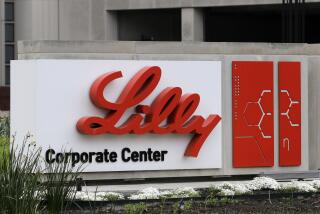MS slowed in test with cancer drug
- Share via
An experimental treatment for multiple sclerosis that targets a portion of the immune system not previously subjected to therapy reduced damaging lesions of the nervous system by 91% and relapses of the disease by 58%, researchers report today.
A single course of the drug, called rituximab, helped patients for the full 48 weeks of the trial and suggests a new way to treat relapsing-remitting MS, the most common form of the disabling disease.
Researchers said they were still concerned about potential long-term side effects of the drug, which is used under the brand name Rituxan to treat non-Hodgkin’s lymphoma and rheumatoid arthritis, like MS an autoimmune disease.
If its safety and efficacy can be confirmed in a larger study, rituximab “looks like it will be a strong addition to our armamentarium for treating MS,” said Dr. John Rickert, executive vice president of the National Multiple Sclerosis Society, who was not involved in the study. “We are all excited about this.”
The findings also provide “important insights into the biology of the disease,” wrote Dr. Henry F. McFarland of the National Institute of Neurological Diseases and Stroke in an editorial accompanying the study in the New England Journal of Medicine.
The results revealed an unexpected role for white blood cells called B cells in causing the damage produced by MS, opening the door to a number of potential new therapeutic strategies, he said.
Multiple sclerosis is a disease in which the body’s own immune system attacks the protective layer of myelin around nerve fibers, producing short circuits.
Symptoms include visual disturbances, difficulty walking, fatigue, and loss of coordination, sensation, and bowel and bladder control.
About 85% of the 400,000 Americans with the disease have relapsing-remitting MS, in which attacks are typically followed by periods of remission -- although each relapse typically leaves the body more damaged.
Six drugs are approved for treating relapsing-remitting MS, but their effectiveness is limited. All target the immune system’s T cells, which attack and destroy viruses, abnormal cells and other foreign organisms.
But recent research has suggested that B cells, which produce antibodies, also play a role in MS attacks.
Dr. Stephen L. Hauser of UC San Francisco and colleagues at 31 other centers around the country decided to test rituximab because it targets B cells, particularly those with a receptor called CD20 on their surface.
The researchers gave infusions of rituximab to 69 patients at the beginning of the study and again two weeks later, while 35 patients received a placebo. None were using other treatments for MS.
Periodic MRI scans of study participants showed fewer new lesions in the brain.
Improvements were noted within four weeks. By the end of 24 weeks, 14.5% of the patients receiving rituximab had suffered relapses, compared with 34.3% of those receiving a placebo. By 48 weeks, the corresponding figures were 20.3% and 40%.
The findings “tell us that B-cell-directed therapies are enormously promising for future treatment,” Hauser said. “Equally exciting, it tells us that B cells need to be front and center in our thinking about what makes MS happen in the first place.”
But experts said a longer study involving more patients was needed before the treatment was adopted.
“This is simply a snapshot in the course of a chronic, degenerative disease,” said Dr. Peter Calabresi, director of the Johns Hopkins Multiple Sclerosis Center.
“Whether a patient ultimately becomes disabled determines whether a drug is useful or not,” said Calabresi, who treated some of the patients in the study but was not an author of the paper.
Researchers are also concerned about the possibility of subjecting patients to serious infections by defanging their immune systems.
Another MS drug, sold under the trade name Tysabri, was withdrawn temporarily from the market after two patients receiving it developed progressive multifocal leukoencephalopathy, a viral infection of the brain.
A handful of patients receiving rituximab for other diseases have developed the same disorder, but researchers now think it only occurs when the drug is combined with other powerful immune system suppressors.
A second trial is underway to test against primary progressive MS, in which deterioration is continuous. Results are expected later this year.
The study was designed and funded by Genentech Inc. and Biogen Idec Inc., which sell Rituxan. Most of the authors have received funding from the companies.
--




